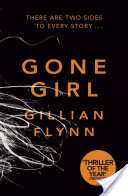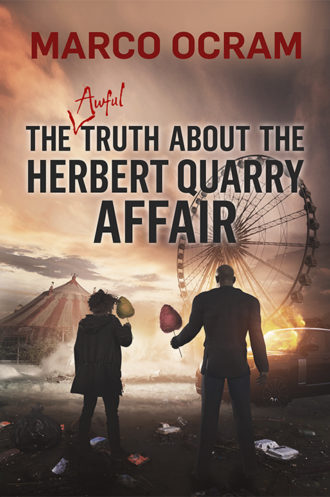
Remember how awful Nick and Amy Dunne were in ‘Gone Girl’? They just got worse.
‘Gone Bitch’ – one of two parodies of Gillian Flynn’s bestselling ‘Gone Girl’ – is a cruder take on the original with even more unlikeable characters.
N.B. If you’ve not yet read ‘Gone Girl’ but intend to do so then I suggest you stop reading this review as, inevitably, there will be spoilers in relation to the original plot. (Not sure whether or not you want to read it? You can find my review here.)
What’s it about?
Nick is a complete idiot who has been a terrible, faithless husband. Amy is a bitch. Now she’s missing and Nick is glad because he can attend search parties for her in order to hit on women with lines like “I’d like to search your bush.” He’s also glad because, y’know, she’s a bitch. Now Amy’s gone he can focus on his porn stash, the student he’s screwing and spending time with his sister, Go.
What’s it like?
An exercise in hyper-exaggeration. Think about when “Scream” became “Scary Movie”; that’s the kind of rude, crude parody you’ll find here. Original Nick’s slightly odd relationship with his weirdly named sister becomes an incestuous one. Rand and Marybeth’s obsession with selling their ‘Idiotic Amy’ range of books leads them to give the police pictures of the character from their books rather than pictures of their missing daughter. And Amy? Amy is just a megabitch who devotes her life to screwing up Nick’s.
Is it worth a read?
Well, it’s short so it probably wouldn’t take you long, (it only took me a few hours to read and my ereader progress bar seemed to increase a percentage point almost every time I turned a page,) but I really didn’t enjoy this and could have used those hours much more productively elsewhere. I think it’s just not my type of humour – far too silly and often too offensive for my tastes.
‘Amy was gone.
Hooray!!!!!’
For instance, when Amy loses her coveted status as an ‘elite’ yelp reviewer, she expresses her frustration at Nick through a number of brief reviews, including this one of Nick’s penis:
Pros: is a penis, fits inside my vagina.
Cons: is small, doesn’t give me an orgasm.
In another ‘humorous’ change, Nick and Amy’s house is on the river. Sorry, I mean, in the river. They need a canoe to travel to and from. Um, okay then.
There are some minor treats. You know the way characters deliberate in crime fiction? Lookner mocks this trend when Nick is assessing the condition of his house as he approaches by canoe. Among other thoughts, Nick notes that: “we always kept the door closed when we were at home [as one just does? Surely? Oh no, it was closed…] so sea otters wouldn’t wander in”.
The first genuinely funny moment occurred at the end of the first chapter:
‘Amy was gone.
Hooray!!!!!’
The contrast between how you might expect a grieving husband to behave and how Nick behaves does lead to some laughs. At one point Nick kept trying to call Amy’s cell phone…because every time she didn’t pick up he got excited by the idea that she might be gone for good. Similarly, he decides to visit suspect Desi Collings himself because the police will take too long; if Desi has murdered Amy then Nick needs to know – he needs to celebrate!
Problematic humour?
I appreciate that this is a parody and isn’t meant to be taken seriously BUT I couldn’t help but cringe at the way men and women are presented throughout this book. Men are alright, even when they’re incredibly thick and think of nothing but sex. They’re alright even when they shag their sisters. Women, on the other hand, are Bitches. All. The. Time.
“Rand and Marybeth were both trained psychologists and they realised that a woman’s need to feel superior to other women is actually part of her psychology when she’s as young as five”.
Nick is harsh about Amy but Amy is harsh about her sex. Diary Amy tells readers that ‘player’ is “a term girls invented to make themselves feel better about a guy who fucks them and doesn’t call afterwards”. Nick is thick but that’s an individual problem, (we’re not told that all men are thick) while Amy is presented as representative of her sex – always commenting on how the world is structured and what ‘hot girls’ want. This bias is perhaps clearest when we learn the secret of Rand and Marybeth’s success with the Idiotic Amy book:
“Rand and Marybeth were both trained psychologists and they realised that a woman’s need to feel superior to other women is actually part of her psychology when she’s as young as five”.
No one is likely to agree with Nick when he thinks homeless guys are happy men who’ve opted to escape paying alimony and child support. It’s all just a big joke, right?
Of course, we are clearly not meant to take this seriously. No one is likely to agree with Nick when he thinks homeless guys are happy men who’ve opted to escape paying alimony and child support. It’s all just a big joke, right? And yet…while Nick perceives himself as “like a kid caught stealing from the cookie jar” for having sex with another woman after his wife’s disappearance, Amy perceives herself as incapable of being nice because she’s too attractive. And somehow it’s true of the whole story. While Nick is so moronic he’s almost sweet, Amy is just deliberately a bitch. I think that’s the key: Nick can’t help himself (guys can’t help themselves); Amy deliberately and largely successfully manipulates and lies (women are deceitful liars). It’s an underlying narrative that leaves me feeling slightly uncomfortable.
Final thoughts
I thought the further the plot moved away from the original the better it got. I liked the twists relating to Amy’s parents and to her lovelorn admirer Desi; not only were they entertaining but they were beautifully in keeping with the whole tone of this book. Similarly, the ending is ridiculous but completely satisfying.
Steve Lookner is the author of several parodies, including ‘The Fault in our Pants’, and reviews of his work online are generally very positive. In fact, several reviewers commented that they had read and enjoyed this without being familiar with the original. That said, I suspect this will be much more entertaining to those with at least an idea of the original plot since much of the humour is created by exaggerating things that were already, if you stopped to think about it, a bit odd.
I’m certain there is an audience for this, it just wasn’t for me.


